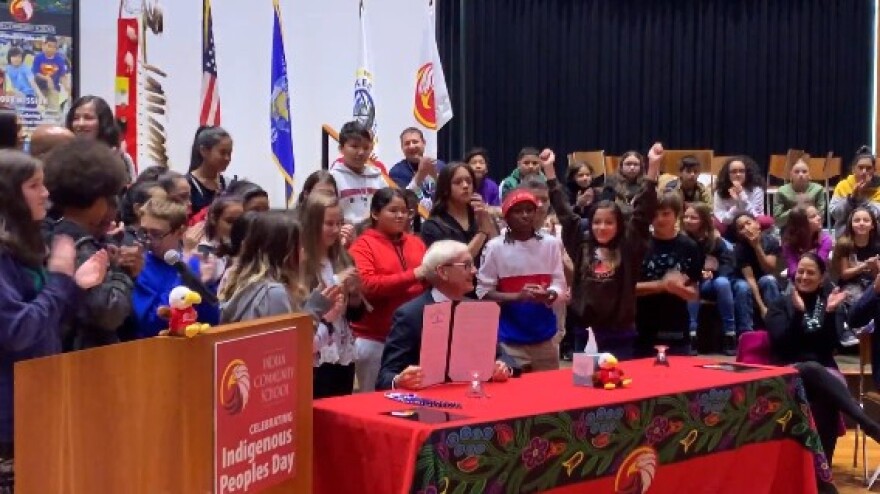Today is Indigenous Peoples’ Day in the United States. The holiday celebrates and honors American Indian people, their cultures, and their rich history — past and present.
It comes on the heels of another day of remembrance — Orange Shirt Day — which began in Canada. It is recognized on Sept. 30 and commemorates the legacy of the Canadian Indian residential school system.
Jason Dropik, head of the Indian Community School in Franklin, said Orange Shirt Day is a way of remembering Indigenous children who were impacted during the boarding school era. That era ended in the U.S. in the late 1970s.
On Orange Shirt Day at ICS, students and staff are gifted orange shirts with the words, "Every Child Matters" in Ho Chunk, Ojibwe, Menominee, and Oneida.
"By wearing those orange shirts and recognizing in our tribal languages the fact that all children are sacred and that our children matter, it's a really important message that we try to share not just with our students, but also with the families in the community at large," Dropik said.
Dropik said that when Orange Shirt Day comes around, announcements are usually read at school and there are educational posters around the school that, for example, show different areas where residential schools existed both in the United States and in Canada, and the numbers of children that have been found.
"So, we try to just make sure that students understand that ... this happened and it happened in communities. And it really has had an impact on language and culture and family structures. And it also wasn't that long ago. So, students understand, that you know, the opportunities that we have to learn our languages together — to be engaged in cultural teachings. It's not something that all of our ancestors have had. And so that idea of gratitude and thankfulness for our school, our communities, families. Being able to help continue to support us," Dropik said.
Dropik said the news from Canada this past summer about the hundreds of graves discovered at a handful of Canadian boarding schools could have influenced more people outside of ICS's local community inquiring about Orange Shirt Day.
"On our social media, for instance, we were able to see that there was more interest in regard to wanting to help support ... I believe that other individual's awareness has been increased in light of what was found and that continued conversation," Dropik said. "I would also say that in general ... there's been a desire by communities in and outside of our own local area to gain more knowledge around Indigenous rights and tribal communities and what does that mean and how does that look."
Dropik said this is important because in Wisconsin that hasn't always been the case.
"Wisconsin has a pretty long history where there's been a lot of division between ethnicities ... Tribal relations with those that are not Native has not always been a great experience for those in Milwaukee or Wisconsin around treaty rights and sovereignty," Dropik said. "There's been challenges. And I think that what we're seeing more recently is that people's willingness to understand more to gain a greater understanding of those around them which we haven’t always had."
For Indigenous Peoples' Day this year, Dropik said he wants people to think about, "Acknowledging and understanding that there are many parts of history that we haven't shared completely. And when we don't share it, then we don't acknowledge the struggles and the challenges that exist so that we can move forward in good ways together."
Dropik added, "Continue to seek opportunities and ask questions. There's a lot of amazing organizations out there doing work to help raise people's awareness, and I think that the more questions we ask and the more opportunities that we share together, I think the better off we are."






